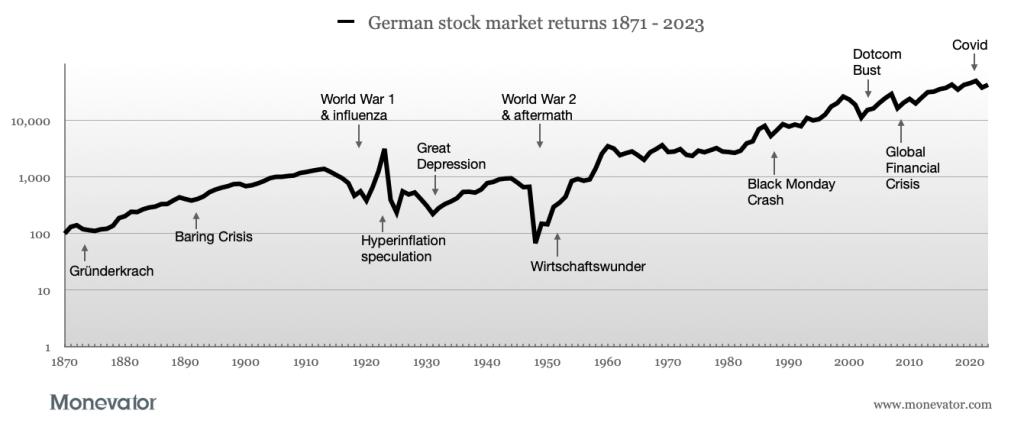
We’re back with another interview with a Monevator reader who has attained financial independence and/or early retirement (FIRE). This month John explains how he achieved a very comfortable retirement by working hard, maxing out pensions, and buying property – all while raising a growing family. Plenty to chew on, especially for those aspiring to Fat FIRE…
A place by the FIRE
Hello John! How old are you and are you married?
I’m 53 and my spouse is 59. We have been together 30 years but only married in the last ten. (We didn’t want to rush!) Marriage does simplify things such as wills, defined benefit (DB) spouse pensions, ISAs, and so on.
We FIRE-ed about seven years ago and we still feel financially secure. But world events and double-digit inflation do concern me.
All this positive talk of inflation eating away at mortgages only works if you get inflationary pay rises. FIRE types may have ‘real’ investments such as property. But they probably don’t get many inflationary increases.
Do you have any dependants?
We have three kids and eight grandkids. The kids are 35-40, the grandchildren 3-23. All three of our children went to university and two work in the NHS. Their lives seem a little harder than ours in terms of getting on the housing ladder and settling into adult life. We still provide some financial help. Mostly interest-free loans and below-market rents.
Childcare can be expensive and we’ve helped out a lot during the last seven years. We even got NI credits for four years!
The little ones are now all in school so it’s more drop-off and pick-ups a couple of days a week. I’ve really valued time with the little ones this time round. The first time I was more selfish and work focused.
The older grandchildren seem like a different species. They just don’t grow up as quickly as I remember. Two of the older ones decided against university. One is an apprentice trades-person and the other works in the hospital, waiting for a suitable apprentice opportunity.
Whereabouts do you live and what’s it like there?
We are currently in East Anglia but have lived in the North and South following job opportunities.
The weather is fantastic compared to where I grew up. Rail links are good for the capital.
When do you consider you achieved Financial Independence (FI) and why?
By age 45 I thought I had enough for a fairly ‘Fat FIRE’ – around £5,000 per month – without running down investments in nominal terms, and hopefully not in real terms1.
FI to me means work is an option, not a requirement, and “how much is enough” to achieve that is a tough question for a young FIRE-ee. I needed to be confident that my living standard wouldn’t take too hard a hit and that we’d be robust to changes in interest rates and inflation.
The big question for me was about the gap between the work pensions and exiting date. I had ten years until I could access the defined contribution (DC) pension pot and 15 for the DB pension.
What ultimately decided it for you?
I resigned when I’d truly had enough of working 60 hours per week and being away from home for 150 days a year. The less you need the money, the easier it is to walk away.
Also, as your FIRE fund grows, each extra year of work moves the dial less. At some point you realise your assets earn enough to live off. At that point you start to think about things differently.
What about Retired Early?
I left aged 45 and haven’t returned to any full-time work yet. There has been some interim consulting and contract work and quite a bit of unpaid work with a tech start-up that eventually fizzled out. About 100 days in total paid work – things dried up post-Covid.
I’m still open to day-rate work and short contracts but the telephone calls are much less frequent than when I was working.
If I went back now, my earnings would be lower than when I left. A three to four-month well-paid winter contract every year would be nice. It would make the summers off even sweeter!
Assets: Fat FIRE
What is your net worth?
Current net worth is around £2.8m.
This roughly made up of:
Four properties at £1.2m total (valued at 90% of the 2022 peak)
Defined Benefit pension £900,000
Defined contribution pension £450,000
Cash £250,000
ISA £500,000
General investment account £75,000
All minus two mortgages totaling £500,000 (@Jan23)
The DC pots have been set to retirement age 70 and I’m in the default funds. The ISA and General Investment Account are in the FTSE 100 and Pref shares (45/55% split).
I’m a sucker for yield. I should have bought a world tracker, I know!
The interest-only mortgages have been my friend for 12 years (costing the Bank of England’s base rate +.75% on average across two properties). But now rates have risen, the £1,800 per month interest is starting to hurt. I’ve had such a good run on ultra-low rates it’s hard to complain.
My main (and only) residence makes up about 20-25% of our net worth. It’s a four-bed detached house at 2,000 sq ft set on a quarter of an acre.
We will consider downsizing again soon. I just need to work out how to take the mortgage with me.
Is your home an asset or an investment?
I consider my home to be an asset. It’s an asset that pays your rent.
I often wonder what percentage of net worth is sensible to spend on your home? We have downsized once already and will probably do so again in the next five years. I’m keen to take advantage of the inheritance tax rules, so I will downsize in terms of size, but probably not value.
My three remaining buy-to-lets are clearly investments and a hassle I don’t need. I would like to sell at some point. But evicting family is unlikely, and a spare flat could be handy if we move abroad.
I sold one property last year with a rental yield of 3% and bought preference shares at 6% yield, so I nearly doubled the income. But I subsequently lost the capital gains potential and about 15-20% in their value!
Earning: High-earner, SAYE, and property investment
What did you do in your regular income-earning days?
I spent my career working in the finance departments of insurance companies in senior technical and director-level roles.
In order to achieve pay rises, I frequently applied for external roles. Sometimes I left and sometimes I stayed with a pay rise.
In all I had about seven different roles over 24 years, and worked at five different companies.
For the first half of my career my average earnings were ~£40,000, including a car and bonus, but excluding the DB pension. The second half averaged around £170,000 (including car, DC pension, and bonus). Total career earnings excluding the DB pension was around £2.5m, before tax & NI.
Other income sources included Save As You Earn (SAYE) share schemes and similar discounted share buying schemes. I tried to invest the maximum. Free money is the best money! I ended up with around £250,000 of employer company shares in total. All sold now, with minimal CGT.
Buy-to-lets happened accidentally at the first, and then on purpose. We relocated with work and we didn’t sell the old house for a few years.
All told we’ve bought nine properties. Four main residences and five rentals. Across the properties there has been around £900,000 capital growth and £250,000 income. Costs are harder to total up!
Did thinking about FIRE influence your progression?
Planning to retire early didn’t impact my career. With hindsight I wish I’d moved jobs sooner and more often to get broader experience.
I should also have been more choosy about my first graduate employer. A good graduate training program can offer a great foundation and career springboard.
Saving: a saver born and bred
What is your annual spending? Do you stick to a budget or otherwise structure your spending?
We don’t actively stick to a budget, but I’m a value-focused Northerner who isn’t keen on waste, and who demands value for money. It’s probably to my own detriment. I’d rather go hungry in an airport than pay £15 for a burger! But your money DNA or blueprint stays with you.
I’m very aware of what income is coming in and try not to spend too far over that level. The large volatile number is travel and holidays. And also gifts to kids.
Our income will increase significantly when I can access my pension pot at 55 and final salary pension at 60. Until then we stick to spending the current income, but we probably could spend more.
What percentage of your gross income did you save over the years?
I don’t have good record keeping for savings and cash flows.
The first half of my career didn’t involve savings, apart from owning two houses, a DB pension, and some employer shares. I recall my net worth was around £250,000 after 13 years, excluding the DB pension. Roughly £200,000 was from the houses, which benefited from the fall in interest rates around 2001.
In the second half of my career I moved to DC pensions. I usually put in about 10% on top of the company’s 10-15%. Towards the end I also put in bonus payments.
Based on my DC contribution and the properties I bought for cash, I estimate my savings rate in the last ten year to be around 35% of work earnings. That includes the company pension element.
As earnings increased and then later as children moved out, our savings headroom increased. We never massively changed our lifestyle – yes to nicer car, house, holiday, clothes (my wife) but not in a silly way. We’ve only ever bought one brand new car and my daughter has it now 12 years later. The cost of that car works out at about £4 a day so far…
Essentially, most of the money came when we were over-35. By then we were set in our financial ways. It isn’t always a good thing. I’m going to Tesco later to take advantage of an £8-off coupon!
That’s always a good thing in my book! But what is the secret to saving more money?
Earn more, earn more, earn more!
Maximise free money – pension contributions. Don’t buy new cars, learn to cook, avoid keeping up with the Jones’s, and aggressively manage your direct debits and bills.
Savings happen when you earn more than your lifestyle is costing you.
If you want money and freedom, you must focus on your market worth in the job market. Think long and hard – about what industry, qualifications, and training time are required – and then work hard to become expert and knowledgeable.
Add value, be flexible, and move companies often.
Do you have any hints about spending less?
Everyone is different and enjoys different things. I suppose actively think about the cost of something versus how much joy it brings. We don’t think about opportunity cost often enough.
Looking at the grandkids, they seem to have a problem with delayed gratification and labels. They have £100 a month or more mobile phone contracts, £14,000 car loans – this when they’re 20 and earning £300 a week or similar.
I have a friend who is a city lawyer charging £600 per hour. Listening to his lifestyle is completely alien to me (but hugely interesting).
Having too many friends a lot wealthier than you must cause some anxiety and extra spending. So pick your social circle thoughtfully.
Investing: not over-thinking or too taxing
I tend not to check share prices too often and intuitively like the invest-and-forget approach.
Rebalancing hasn’t happened yet. So, I’d say I’m passive in that I very rarely buy or sell.
Most of my investments were made before I found the FIRE websites and before I read the books. A big mistake was not buying world trackers to begin with.
Best investments – or rather lucky ones that worked out well:
Discounted company share schemes. Put in about £75,000 investment, sold for around £250,000 over a 20-year period.
Residential property – we must be close to £1m up over 25 years.
Joining the DB pension scheme on my first job, even though I thought I was leaving within two years.
It’s hindsight speaking, but while I was financially comfortable enough to have gambled a small percentage of my money on crytpo or tech shares in the recent boom, I didn’t do it. I lost £1,000 on Motion Poster shares in around 2000 and didn’t try my luck again!
I have no idea what my overall return has been. I mostly focused on the earnings and tax-efficient savings. Once I realized the size of the DB pension, the pressure was off a little.
Can you tell us more about your thinking about tax-efficient savings?
Tax incentives have had a big influence on my strategy. Pension tax relief at 40-50% was too good to ignore. My timing was fortunate in that the annual allowance taper didn’t exist – and I took Fixed Protection 2014 to preserve the £1.5m limit.
My plan is to drain the DC pot from age 55-60 tax efficiently – no 40% tax – and I will probably get close to hitting the £1.5m in aggregate.
DC pension contributions were around £250,000 for 2006-2014, including the company element. Avoiding 40% tax in retirement is also probably what led me to max out ISA for the last 12 years (for me and my wife).
I do wonder sometimes if I over focus on tax efficiency at the expense of growth.
Wealth: buying freedom
Did you have a target for when you’d consider you’d ‘made it’?
Between my late 30s and my early 40s my ‘number’ was around £800,000 plus pensions. But once I got close to this the number I revised it to £1.2m plus pensions. Mostly because 15 years is a long time to wait for the pension.
In real terms I’m broadly level with the 2016 position. I’ve given up potentially a lot of earnings, but I gained a lot of freedom and time.
There is still a niggling question around my children’s finances. Should I return to work to make their lives a little easier?
Things I wished I’d known sooner, or thought about more:
Your spending habits change as you get older or retire. New shiny stuff isn’t that important – apart from a nice iPad obviously!
Enjoy the journey more. Why rush? Some things are better enjoyed 25-40 than at 45-65.
If you didn’t find time for it when you worked then you probably won’t when you retire. Fitness, learning Spanish, and so on.
My working 60 hours a week for that last ten to 15-year stint was probably unnecessary.
Do you have any passions, hobbies, or vices that eat up your income?
We used to smoke, which was incredibly expensive. But we stopped after getting a cancer diagnosis. That was probably the catalyst for aiming to retire by 50. It also makes me think about selling the DB pension.
Our main areas of discretionary spending are family, travelling, holidays, and motoring. Motor homes aren’t cheap! I decided against flying lessons and I struggle mentally with the David Lloyd £120 per month membership. So I found one costing £32 with a monthly rolling contract instead.
We don’t have expensive tastes. That’s probably a good thing. An £8 bottle of red is good enough for us.
In the longer-term we are giving serious thought to moving to Spain or Portugal. The older I get the more I like spending time in shorts and in the sun!
Your money mindset
When did you first start thinking seriously about money and investing?
I grew up fairly poor on a council estate in the North. Since money was always short, I’ve always being focused on getting more of it. Probably over-focused.
Being relatively poor shapes you and your thinking, and it’s hard to change. I gambled quite a lot in my 20s but stopped when I started earning good money.
My 20s were focused on kids, career, and trying to get housing security. We spent five Christmas Days in five different houses. Tough with three kids.
Late 20s saw earnings increase. I took advantage of Save As You Earn share plan schemes (SAYE) to the tune of £250 per calendar month. This was probably my best decision as within a couple of years they were worth £60,000, though only briefly. I settled for about £30,000 in the end.
My 30s were about career, bigger houses, nicer cars, and a move from final salary pension to a money purchase DC pension.
From 40-45: my career, the four BTLs, and I started an ISA and maxed it every year since.
Around 45 I left work, downsized property, and tried to invest the proceeds sensibly.
Did any particular individuals inspire you to become financially free?
Mostly it was just that strong desire not to be poor – and to never be poor again.
The best FIRE resources are websites – Monevator, Indeedably, Simple Living in Somerset, and Retirement Investing Today2. When I first found these websites it was like I’d found my tribe.
A lot of the old websites have died and their creators have (hopefully!) moved on to better things.
Other interesting reads include
Early Retirement Extreme – hardcore saving for retirement, with much to think about.
The 4-Hour Work Week – read this around 2009 and loved the creativity and different style of thinking. Not sure about the podcast though!
I’m also a fan of Nassim Taleb, Tim Hale, Mark Spitznagel’s safe Haven, and The Psychology of Money by Morgan Housel
What is your attitude towards charity and inheritance?
Seeing my father-in-law deteriorate quickly aged around 80 led my to see that the phrase “go-go years, slow-go years and no-go years” is probably correct.
I plan to help the kids into their own houses. One has already bought a buy-to-let off me, with a 25% discount. As an aside, filling their LISA accounts is great tip for free money from the government.
We also currently help with childcare, holidays, after school activities, and so on. I see this continuing.
An inheritance unknown is the grandchildren. We have about eight, but the number grows! They are aged between 3-23. My gut says to focus on their parents as they are not comfortable enough and let them sort out the grandkids.
Most of my giving or charity is within the family. This may change when I’m older and the kids are sorted. I admire those who tithe but I’d worry about what if I need it later myself? Growing up poor stays with you.
What will your finances ideally look like towards the end of your life?
My assumption is I have 25-30 years left.
I’m aiming to spend or give away down to around £1m in the ISAs and then maintain at that level. We will also probably have £1m in property – which is above the inheritance tax (IHT) main residence allowance – so there will be IHT to pay. I haven’t really given IHT enough thought, I tend to over-focus on income tax.
When we have a greater understanding of our spending patterns as we age, I can see gifting accelerating, because my DB and State pension together should be more than enough.
Mental abilities fade so I want to simplify and de-risk in later life. I’ve thought long and hard about selling the DB pension, as it dies with us. But keeping it also simplifies things. I can’t spend it, I can’t lose it, and it’s guaranteed (mostly).
My ambition is to give my kids the option to retire a little early. Two work in the NHS and should have decent pensions. I’d like them to be mortgage-free by 60 and have the option to give up work 5-10 years before the state pension. I probably don’t have enough to make that happen but I should be able to help.
The money game took a lot of my energy and focus from a young age. It’s funny how once you have ‘enough’ it’s just not important anymore.
Perhaps I’m lucky not to know many very rich people. I can see how that would make you more competitive.
But if £2m is your ‘enough’, and you have £3m, then wasting your life (and time) chasing £10m seems a bit nuts to me.
Lots of life lessons in there readers. Of course John’s balance sheet is at the higher end of the FIRE spectrum and will be out of range for many. But equally lots of our readers might well get there in the long-term. Besides, enough is enough, whatever your enough is, as John concludes. Questions and reflections welcome. As usual please remember John is not a regular Internet commenter and he is just sharing his story to inspire others, not to provoke nastiness. Of course you can disagree on practical matters constructively, but please keep that in mind. One particular person’s situation isn’t a comment on yours. Thanks!
That is, inflation-adjusted.Note: We’ve not linked to this or Early Retirement Extreme below as the site owners have not updated the security to HTTPS.
The post FIRE-side chat: Fat FIRE, with kids and grandchildren in mind appeared first on Monevator.



